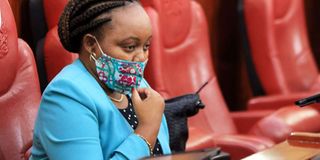Different impeachment styles are bound to worsen impunity

What you need to know:
- Former Kiambu Governor Ferdinand Waititu had the full plenary session involved in his successful impeachment.
- The fact that we have different modalities to impeachment negates the whole notion of thresholds.
I am not surprised that the Kirinyaga Governor Anne Waiguru was acquitted by the Senate committee that was set up to hear her impeachment case.
But I do not mean either to say I was sitting by the television wishing ill-will came to Ms Waiguru. I am saying our impeachment systems leave a lot to be desired. Like many others, I will raise my hand and admit that I felt the acquittal was a foregone conclusion; the hearings were mere formalities.
At least in Waiguru’s case, an attempt was made to consider the claims of impropriety against her. Her Nairobi colleague Mike Sonko, who, incidentally, faced corruption charges at the time of his aborted impeachment, was not even put through hearings, the process having been halted midway.
FULL PLENARY SESSION
Former Kiambu Governor Ferdinand Waititu, on the other hand, had the full plenary session involved in his successful impeachment.
The glaring discrepancy in the standards applied to impeach politicians by the Senate is one that is crying out for prompt review.
It appears that the Senate is cherry-picking impeachment cases and decides which ones are fit for confirming, acquitting on flimsy grounds or never to impeach. We are now informed that, in Waiguru’s case, the threshold for impeachment was not met.
Was there a benchmark laid out in the public domain, measured in percentages and decimals so that we know when a threshold is ever attained?
The fact that we have different modalities to impeachment negates the whole notion of thresholds. Standardised impeachment would let us be able to set those ‘thresholds’ in a way that reflects the uniform manner individuals are impeached.
We cannot talk of thresholds missing when Chapter 6 of the Constitution and the Economic Crimes Act are clear on breaches of the law. The anomalies sound deliberate and coud lead to further injustice to the voters and those unfairly impeached.
Impeachment is more often considered a political exercise; albeit true to a point, however, its roots are anchored in law. The facts being considered are primarily of a criminal nature — whether it is loss of public funds or violation of the Constitution.
SEMANTICS PLAYING OUT
What we saw in Waiguru’s matter was semantics playing out in a Senate set up to do oversight of the counties. Claims that it is there to whitewash criminals are worrying. Failure of both Houses of Parliament to play their oversight role effectively leaves further room for violation of the Constitution and weakening of democratic institutions.
Due process — which impeachment is — is there to ensure fairness and justice. But these can only come about if the due process itself is conducted in a manner that is lawful, standardised and held in the public domain. Bending rules in favour of some politicians and not others makes a mockery of our democracy. It does not instill confidence when individuals who prima facie evidence shows are guilty as sin are let off after strings are pulled for them by invisible forces.
Two other issues that arose during Waiguru’s impeachment are nepotism and conflict of interest. It was fair that she was accorded a defence team — led by her husband, who had unfair advantage from the outset. He could not remain objective with the subject matter being his wife. He was always going to be biased in her favour.
If relatives are not allowed to be our referees for work or college admission, why should they be involved in a legal matter against others? This was not a family affair but a national one with public interest at its core. With the rise in corruption, it also begs the question how far family members are entrenched within public offices. Lessons have not been learnt from Waititu’s case, it seems.
CORRUPTION
The fight against corruption calls for an altruistic approach and involvement by all and sundry. Having different styles for politicians who blatantly abuse their offices or embezzle public funds makes the fight against corruption a charade. Pulling strings for some and not others is not going to get us out of the cesspool of impunity. Are we truly fighting corruption and abuse of office or perpetuating them?
The recent interference of impeachments shows political parties are the biggest threat to the war on graft yet they must pull together with the rest of us to end the scourge.
They can use their numbers for good rather than bully and intimidate those standing up for the rule of law. Political parties should not just talk but walk the talk too.
It is understandable to come out strongly and support a party member. But it is corrupt to stand by one who is neck-deep in impunity. Impeachment is not for whitewashing kinsmen and women in the political sphere but to weed them out. Standard impeachment rules are the panacea to corruption and poor governance.
Ms Guyo is a legal researcher. [email protected] @kdiguyo




